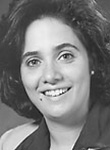Cornell's Michal Lipson wins NSF 'Early Career' award to study photonic circuits
By Media Relations Office

ITHACA, N.Y. -- Michal Lipson, Cornell University assistant professor of electrical and computer engineering, is among this year's recipients of National Science Foundation (NSF) Career Awards. The NSF Faculty Early Career Development Program offers NSF's most prestigious award for new faculty members, supporting the early career development activities of those teacher-scholars who are considered most likely to become the academic leaders of the 21st century.
Lipson will receive a five-year grant of $450,000 to support further research in photonics, in which circuits consist of tiny beams of light interacting on a chip. The result, Lipson says, will be low-power, high-bandwidth, high-speed and ultra-small optoelectronic components.
Lipson already has demonstrated methods to guide, filter, bend and split light on silicon chips at much smaller dimensions than attained by previous researchers, offering the promise of photonic circuits as small as current electronic chips. Confining light in very small spaces, where the dimensions of the waveguide are comparable to the wavelength of the light, has, in fact, been the secret for making some of these devices work, Lipson reports.
Research under the new grant will continue the development of all-optical and electro-optical circuits. Lipson plans to combine the various circuit components she has created into working systems and find out how to build the systems most efficiently. The goal will be to minimize the losses, size and power of the system while maximizing the bandwidth.
She also will study ways to connect photonic circuits to the rest of the world. Two remaining bottlenecks are the interface between photonic chips and larger optical components, such as optical fibers, and using an electrical signal from conventional electronics to switch or modulate a beam of light in a photonic circuit. Lipson already has built devices that accomplish these goals but hopes to refine them and see how variations in the size and geometry affect performance.
Lipson also plans to refine the techniques used to manufacture photonic chips. While this is similar to making electronic chips, there are special requirements, such as a demand that the walls of waveguides be optically "smooth." "This investigation is crucial to the real implementation of the concepts of this proposal," Lipson says.
Lipson studied physics at Technion-Israel Institute of Technology in Haifa, Israel, receiving her B.A. in 1992, M.S. in 1993 and Ph.D. in 1998. From 1998 to 2001, she worked as a postdoctoral researcher at the Massachusetts Institute of Technology before joining the Cornell faculty in the fall of 2001. She is the holder of eight patents on novel micron-size photonic structures for light manipulation and the author of more than 30 papers in the major research journals in physics and optics. She is a member of the Institute of Electrical and Electronics Engineers (IEEE), the Materials Research Society and the Optical Society of America.
Media Contact
Get Cornell news delivered right to your inbox.
Subscribe